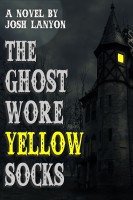The Brief History of the Dead - Brockmeier Kevin (первая книга txt) 📗
The darkness outside was constant, with no trace of sunlight, so there was no reason for her to wait until morning to get under way. Morning wouldn't break for another month or so, anyway. A night so long made the sunrise seem imaginary – like Atlantis, or the Heavenly City, or the Garden of Eden. A pipe dream, she thought. Or maybe she should say a daydream.
The stars were nearly motionless. The moon was a brilliant white wedge, emerging from behind a thick bank of clouds. She packed her new equipment into the sledge's storage hutch, slipped the latch into place, and took one last walk around the building. One of the klieg lights, the one directly above the graves, shone hard and straight onto the twenty mounds, so that they cast heavy foreshortened shadows that pooled against the wall of the station like oil puddles. The wind shifted, and she heard the scraping and buckling sound of the sea ice. She headed back out to the courtyard and started the sledge.
She was worried that the fuel cell might have chipped in the freezing weather, breaking the circuit, but as it turned out, she had no reason to be. The engine engaged with a muffled hum that slowly grew louder. First the headlights brightened, and then the runners lifted, and then the internal GPS monitor flickered on, which meant that at least one of the polar relays was still working.
But the rest of the relay system must have been down – or large patches of it, anyway. The display indicated that she was at 2° S, 39.4° E, just south of the equator, somewhere around Kenya.
She took a long, broken breath, closed her eyes, and rested her head on the steering column. She was trying to decide whether or not she should laugh.
NINE. THE NUMBERS
How many people was any one human being likely to remember? A thousand? Maybe if you were cursed with a particularly slipshod memory. So then – ten thousand? A hundred thousand? A million? Of course, if you ran out your life in some small village deep in the Himalayas, the number would be greatly diminished, but Michael Puckett wasn't thinking about Himalayan villagers. Or monks, or nuns, or kids who never lived past that falling-down-drunk stage of toddlerhood. He was thinking about himself, his own life, and by extension he was thinking about Laura. She was the common element, after all, the link or what have you. After all the discussion he had heard in the city, that much was obvious.
He had spent the better part of a week trying to come up with a good solid number, one that took his entire forty-three years of life into account. At first he tried to make the calculations mentally, sorting through the great crowd of people in his head as he listened to the stereo or rested in bed at night. But when he realized how complicated the whole matter was turning out to be, he pulled out his #2 pencil and a blank pad of paper and settled down to work.
He began with his immediate family – his mother, his father, and his two sisters, plus the older brother who had died at the age of eleven when he snapped his neck jumping his bike into a creek-bed. Then he added his extended family into the mix: both sets of grandparents, his aunts and uncles, his great-aunts and great-uncles, his cousins, including his second cousins, the husbands, wives, and children of his cousins, the second husbands and second wives and in some cases the second children of his cousins, and so on. Next he counted off his schoolmates and teachers, from kindergarten through graduate school, and then the schoolmates and teachers of his sisters, tagging on the occasional college friend that the two of them had brought home for a visit. There were his neighbors to remember. There were the people he knew from work, beginning with his first job sliding pizzas into ovens at Pizza D'Action and ending with his sixteen years at Coca-Cola. There were the members of his church, though when it came to church, he had never been what anybody would have called devout. He was more of an Easter-Christmas-and-whenever-someone-managed-to-drag-his-ass-out-of-bed-on-a-Sunday kind of guy. And then there were the thousands of loose friends who kept jumping into his memory – people who didn't fit into any obvious category, but nonetheless there they were, like acorns that came popping out of the grass as he mowed his lawn. There were the friends of those friends, and sometimes there was even another tier of friends beyond that. He added his girlfriends to the list (there had been seventeen of them), and his girlfriends' families, and then his first wife and her family, and his second wife and her family, and of course there was his son and his son's classmates and his softball team and his other friends from the block and whatnot. And there were all the people he had met at plays and dinner receptions and parties and weddings over the years. Oh, and then there were what he supposed he might call his personal commercial acquaintances, as opposed to his professional commercial acquaintances – his business contacts and such – though now that he thought about it, he guessed he would have to take them into account, as well. He was thinking of all the clerks and salespeople he knew by sight and sometimes even by name: the people who worked at the grocery stores, pharmacies, tool shops, garages, department stores, restaurants, and movie theaters he frequented.
Any number of times he imagined he was finished with the list, but he kept uncovering new clusters of acquaintances: his Boy Scout troop, the other guys at his gym, the twenty-some faces he remembered from his one disastrous AA meeting. He would go to the kitchen to rinse off a plate, and he would remember the plumber who had repaired his faucet for the past ten years, and the rotating lineup of plumber's assistants he had employed, and the son he had been forced to bring on call with him that one day when the schools closed down, who had put a deck of playing cards in Michael's toaster and almost set his kitchen on fire. Everything he saw, touched, or listened to seemed to remind him of a few more people he had neglected to write down. A woman he had seen at the library once and for some reason had never forgotten. His dentist and his dental hygienist. The guys he used to play pool with when he was in college. Finally, when he paged through his notes, he realized that he had forgotten somehow to list his sisters' extended families: their husbands and in-laws, his nephews and nieces, and on and on through the great cascade of additional people who seemed to be connected to everyone he knew, excepting only his brother, the one who had died, who was a broken thread to him and had no such connections.
When he tallied up the list he had made, the number he came up with was forty-two thousand, but for the next few days he kept discovering little pockets and byways of extra people – where did they all come from? – and if he had to guess, he would say that the number was probably closer to fifty thousand, or maybe even seventy.
"I can't believe it would be that high," Joyce said when Puckett showed him the list. "You must be imagining you remember people you don't really remember."
"I was thinking it was probably too low, actually."
"I doubt that." He gave the dismissive little stiff-palmed wave of his fingers – nothing more than a twitch, really – that he always used when he wanted to drive Puckett crazy. "Underestimation has never exactly been your defining characteristic."
Puckett ought to have buried him when he had the chance.
Joyce had succumbed to the Blinks just a few hours after they set out for the penguin roost. He had taken on a sagging posture that Puckett had mistaken for sleep until the sledge rounded a curve and Joyce tipped over sideways, striking the window with the side of his face. All at once, Puckett knew the truth. He cut the engine and felt Joyce's neck for a pulse. His skin was still warm, but there was nothing moving beneath it – no air, no blood. Even the muscles had lost their tension. It was the seventh death Puckett had seen in the past two weeks. He was getting used to the signs.




